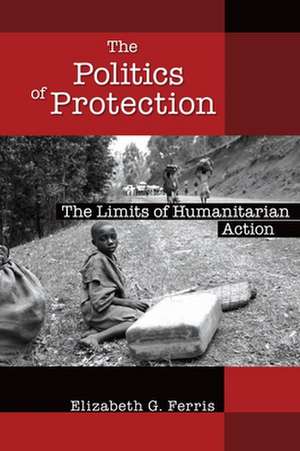The Politics of Protection: The Limits of Humanitarian Action
Autor Elizabeth G. Ferrisen Limba Engleză Paperback – 30 mar 2011
For the past decade, humanitarian actors have increasingly sought not only to assist people affected by conflicts and natural disasters, but also to protect them. At the same time, protection of civilians has become central to UN peacekeeping operations, and the UN General Assembly has endorsed the principle that the international community has the "responsibility to protect" people when their governments cannot or will not do so. Elizabeth Ferris explores the evolution of the international community's understandings of protection, with a particular emphasis on the humanitarian community.
"Protection" is a noble word, with positive connotations, but what does it actually mean in practice? Does providing assistance to vulnerable people protect them, for example? Does monitoring the number of rapes protect women? Does increased engagement in protection activities by humanitarian agencies jeopardize the cornerstone humanitarian principles of neutrality and impartiality?
In The Politics of Protection, Ferris examines inconsistent ways in which protection is defined and applied. For example, why do certain groups receive international protection while other equally needy groups do not? Her case studies, ranging from Iraq to Katrina, illustrate the challenges—and limitations—of protecting vulnerable populations from the ravages of war and natural disasters. Ferris argues that the protection paradigms currently in use are inadequate to meet the challenges of the future, such as climate change, protracted displacement, and the changing nature of warfare.
"Protection" is a noble word, with positive connotations, but what does it actually mean in practice? Does providing assistance to vulnerable people protect them, for example? Does monitoring the number of rapes protect women? Does increased engagement in protection activities by humanitarian agencies jeopardize the cornerstone humanitarian principles of neutrality and impartiality?
In The Politics of Protection, Ferris examines inconsistent ways in which protection is defined and applied. For example, why do certain groups receive international protection while other equally needy groups do not? Her case studies, ranging from Iraq to Katrina, illustrate the challenges—and limitations—of protecting vulnerable populations from the ravages of war and natural disasters. Ferris argues that the protection paradigms currently in use are inadequate to meet the challenges of the future, such as climate change, protracted displacement, and the changing nature of warfare.
Preț: 309.70 lei
Nou
Puncte Express: 465
Preț estimativ în valută:
59.26€ • 61.87$ • 49.05£
59.26€ • 61.87$ • 49.05£
Carte tipărită la comandă
Livrare economică 04-18 aprilie
Preluare comenzi: 021 569.72.76
Specificații
ISBN-13: 9780815721376
ISBN-10: 0815721374
Pagini: 359
Dimensiuni: 152 x 229 x 24 mm
Greutate: 0.52 kg
Editura: Brookings Institution Press
Colecția Brookings Institution Press
ISBN-10: 0815721374
Pagini: 359
Dimensiuni: 152 x 229 x 24 mm
Greutate: 0.52 kg
Editura: Brookings Institution Press
Colecția Brookings Institution Press
Notă biografică
Elizabeth G. Ferris is a senior fellow in Foreign Policy at the Brookings Institution, where she is codirector of the Brookings Project on Internal Displacement. Prior to joining Brookings she spent twenty years in the field of humanitarian assistance, most recently with the World Council of Churches in Geneva.
Descriere
For the past decade, humanitarian actors have increasingly sought not only to assist people affected by conflicts and natural disasters, but also to protect them. At the same time, protection of civilians has become central to UN peacekeeping operations, and the UN General Assembly has endorsed the principle that the international community has the "responsibility to protect" people when their governments cannot or will not do so. Elizabeth Ferris explores the evolution of the international community's understandings of protection, with a particular emphasis on the humanitarian community.
"Protection" is a noble word, with positive connotations, but what does it actually mean in practice? Does providing assistance to vulnerable people protect them, for example? Does monitoring the number of rapes protect women? Does increased engagement in protection activities by humanitarian agencies jeopardize the cornerstone humanitarian principles of neutrality and impartiality?
In The Politics of Protection, Ferris examines inconsistent ways in which protection is defined and applied. For example, why do certain groups receive international protection while other equally needy groups do not? Her case studies, ranging from Iraq to Katrina, illustrate the challenges—and limitations—of protecting vulnerable populations from the ravages of war and natural disasters. Ferris argues that the protection paradigms currently in use are inadequate to meet the challenges of the future, such as climate change, protracted displacement, and the changing nature of warfare.
"Protection" is a noble word, with positive connotations, but what does it actually mean in practice? Does providing assistance to vulnerable people protect them, for example? Does monitoring the number of rapes protect women? Does increased engagement in protection activities by humanitarian agencies jeopardize the cornerstone humanitarian principles of neutrality and impartiality?
In The Politics of Protection, Ferris examines inconsistent ways in which protection is defined and applied. For example, why do certain groups receive international protection while other equally needy groups do not? Her case studies, ranging from Iraq to Katrina, illustrate the challenges—and limitations—of protecting vulnerable populations from the ravages of war and natural disasters. Ferris argues that the protection paradigms currently in use are inadequate to meet the challenges of the future, such as climate change, protracted displacement, and the changing nature of warfare.













